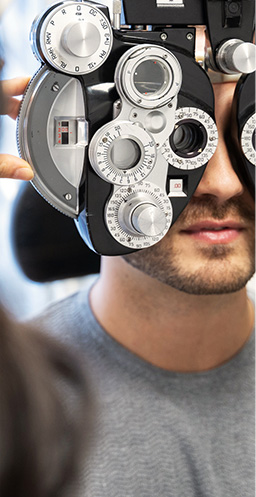Macular degeneration is a leading cause of vision loss in adults over 50, often making everyday tasks like reading or recognizing faces more difficult. The earliest signs of macular degeneration include blurry central vision, difficulty recognizing faces, distorted lines, dark spots, faded colours, and taking your eyes longer to adjust from light to dark conditions and vice versa. Recognizing these symptoms early and seeking care can make all the difference.
What Is Macular Degeneration?
Macular degeneration, often referred to as age-related macular degeneration (AMD), is a chronic eye condition that affects the central part of the retina, the macula.
The macula is responsible for sharp, detailed central vision, which is important for activities such as reading, driving, and recognizing faces. When the macula deteriorates, the quality of central vision declines, making these activities increasingly challenging.
Types of Macular Degeneration
Dry AMD
The most common form of AMD, dry AMD, accounts for approximately 90% of cases. It occurs when the macula thins over time, often due to aging, leading to the accumulation of small protein deposits known as drusen. This gradual deterioration results in blurry or faded central vision.
Wet AMD
While less common, wet AMD is more severe and progresses faster. It occurs when abnormal blood vessels grow beneath the retina, leaking fluid or blood that damages the macula. This type of AMD requires immediate medical attention to prevent significant vision loss.
Early Warning Signs of Macular Degeneration
Catching macular degeneration early is beneficial for preserving as much vision as possible. Watch for the following symptoms of AMD:
- Blurriness or reduced sharpness: A gradual loss of clarity in your central vision, making reading or recognizing faces more difficult.
- Difficulty recognizing faces: Faces may appear blurry, even when you’re up close.
- Distorted vision: Straight lines may appear wavy or bent, a sign frequently associated with wet AMD.
- Dark or blank spots: You might notice shadowed or blank areas in your central vision.
Reduced colour perception: Colours may seem less vibrant or more muted than usual, making the world look duller.
Risk Factors of Macular Degeneration
Certain factors can increase your risk of developing AMD. If any of these apply to you, make sure to schedule regular eye exams:
- Age (most common in adults over 50)
- Family history of macular degeneration
- Smoking
- Prolonged UV light exposure
- Poor diet lacking in nutrients like antioxidants and omega-3 fatty acids
- Chronic conditions such as hypertension, cardiovascular disease, or obesity
By addressing these risks through lifestyle changes and regular eye care, you can take proactive steps toward protecting your vision.
The Importance of Early Detection for Macular Degeneration
One of the most effective ways to combat macular degeneration is early detection. Regular eye exams remain your first line of defence. During these exams, an optometrist can identify subtle retinal changes or protein deposits before symptoms become severe. This allows for timely treatment and management, helping to slow down the progression of the disease.
How Eye Exams Help
Regular comprehensive eye exams include diagnostic tools designed to evaluate the health of your retina. Through techniques like retinal imaging or optical coherence tomography (OCT), optometrists can spot signs of AMD early, well before symptoms appear.
At Stoney Creek Eye Care, we use advanced diagnostic technology to provide you with the clearest picture of your retinal health.

Advanced Treatments for Macular Degeneration
While there is no cure for AMD, numerous treatments and lifestyle adjustments can help slow its progression and preserve vision.
Medical Treatments
- Anti-VEGF injections: These mitigate the abnormal blood vessel growth associated with wet AMD, protecting the macula from further damage.
- Laser therapy: Used in certain cases of wet AMD, laser treatments can help seal leaking blood vessels and prevent additional damage.
Lifestyle Adjustments
Small changes to your daily habits can also make a difference in managing AMD:
- Include foods rich in antioxidants, omega-3 fatty acids, and lutein (like leafy greens, fish, and nuts) in your diet.
- Focus on regular exercise to promote eye-friendly circulation.
- Protect your eyes by wearing UV-blocking sunglasses outdoors.
- Stop smoking. Tobacco use is one of the leading risk factors for AMD.
MacuMira: An Innovative Solution for Dry AMD
At Stoney Creek Eye Care, we’re proud to be one of the first clinics in the immediate area to offer MacuMira, a revolutionary, advanced, non-invasive treatment specifically designed for dry AMD. This Health Canada-approved and clinically proven therapy focuses on the root causes of visual deterioration, offering a promising option for managing this challenging condition.”
How MacuMira Works
MacuMira uses a patented microcurrent delivery system that works through closed eyelids. By targeting the delicate structures of the macula, this therapy stimulates the retinal pigment epithelium cells, improves mitochondrial ATP production, and promotes cellular regeneration.
Why Choose MacuMira?
- Discomfort-free and non-invasive: No needles, no medications, and zero discomfort.
- Patented technology: Maximal effectiveness with guaranteed safety.
- Noticeable improvements within 10 days: After just four 32-minute sessions, patients report significant vision improvements.
- Administered by certified professionals: Delivered by skilled optometrists and ophthalmic technicians, ensuring a safe and personalized experience.
This treatment offers hope to those experiencing dry AMD, helping them to achieve independence and a higher quality of life.
Take Control of Your Vision
Macular degeneration doesn’t have to define your future. By recognizing early signs, attending regular eye exams, and exploring advanced treatments like MacuMira, you can protect your vision for the years ahead.
At Stoney Creek Eye Care, we’re here to help every step of the way. If you’ve noticed any changes in your vision or want to take a proactive approach to your eye health, book an appointment with us today. Together, we can create a personalized plan to manage your eye care needs.









